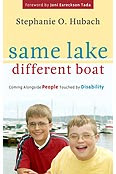book review: same lake, different boat--part two
 In chapter four, author Stephanie Hubach effectively speaks to the "relentlessness" of disability: "For some families touched by disability, relentlessness comes in the form of providing decades of personal care, or heart-wrenching struggles with communication, aggression, or self-injury on the part of the individual with special needs. Maybe it arrives in the form of endless hospitalizations, lack of access to transportation, joblessness, social isolation, or any of a myriad of other issues"(56). I love the way this author paints the realistic picture with brush strokes of specific examples to help us think through the variety of struggles a family faces.
In chapter four, author Stephanie Hubach effectively speaks to the "relentlessness" of disability: "For some families touched by disability, relentlessness comes in the form of providing decades of personal care, or heart-wrenching struggles with communication, aggression, or self-injury on the part of the individual with special needs. Maybe it arrives in the form of endless hospitalizations, lack of access to transportation, joblessness, social isolation, or any of a myriad of other issues"(56). I love the way this author paints the realistic picture with brush strokes of specific examples to help us think through the variety of struggles a family faces.In the face of relentlessness, the only response that offers any true hope is one of "God-reliance." We are all tempted toward one of two extremes--the "victim mentality" or the "'I will beat this' attitude." But Scripture gives us the counter-cultural, God-dependent perspective for dealing with difficulty, in part illustrated through the OT biblical hero of Joseph, a man who was also "thrust into a difficulty not of his own choosing" and found success both in the end and in the meantime.
After firmly laying a biblical foundation for understanding disability, Stephanie moves on to "Part 2" where she specifically addresses needs in a family setting, things such as giving a family time to deal with the natural emotion of grief and allowing them the time to adjust to a "new normal" while they process the changes to their family life. She so graciously challenges to a balance between "privacy" for the family and availability/"presence."
I would do the author and her book an injustice if I were to try to sum up the next few chapters. They are so rich with practical suggestions for building acceptance ("embracing reality as it is right now [and being willing] to embrace reality as it will be when the future becomes the present"), rich with Scripture, and rich in real-life examples that aptly illustrate the truths she is presenting.
In the final paragraph of Part 2, Stephanie draws the following conclusion: "Living with long-term disability can provide a Great Opportunity to illuminate the entrance to the narrow gate" (146).
I will conclude with one of my favorite illustrations quoted from Christopher deVinck:
"I grew up in a house where my brother was on his back in his bed for thirty-two years, in the same corner of his room, under the same window, beside the same yellow walls. He was blind, mute. His legs were twisted. He didn't have the strength to lift his head or the intelligence to learn anything.... I asked my father, 'How did you care for Oliver for thirty-two years?' 'It was not thirty-two years,' he said. 'I just asked myself, 'Can I feed Oliver today?' and the answer was always, "Yes, I can."' We lived with Oliver moment by moment" (qtd 104).
